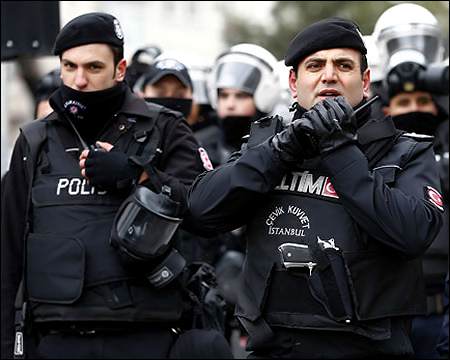Security experts say that a recent legal amendment on moveable properties including weapons will expand Turkish police power and have significant ramifications for the country’s human rights.
A governmental decree published on Jan. 6 in the Official Gazette amended some articles of the Regulation of Moveable Properties of the Turkish Armed Forces (TSK), the Directorate General of Security (EGM) and the National Intelligence Agency (MİT).
Arms and vehicles belonging to the TSK can now be handed over to the police or the intelligence services by approval of the Defence Ministry during public events deemed as “threatening public order”, according to the amendment.
The provides little clarity about how and under what conditions these transfers would take place, raising concern that more heavy-handed responses to public protests could occur. A government critic and former chief of police Hanefi Avcı warned that the amendment might create a grey area where civil rights are jeopardised.
The decision is the latest since the July 15, 2016 coup attempt that has increased both the power and paramilitary capabilities of the Turkish police.
Ten days after the attempted putsch, the government rescinded a key memorandum passed after a “soft coup” in 1997 against a previous Islamist government. The memorandum had taken heavy weapons away from the police, but they would now be returned and the police given the authority to use weapons belonging to the Gendarmerie and Coast Guard Command.
Beyond empowering the police forces, the government has also taken some significant steps to empower its armed civilian supporters.
On January 12, 2018, Fatih Kaya, the leader of the government-loyalist People’s Special Operations (HÖH) group, said that President Recep Tayyip Erdoğan had declared jihad, that his group’s size had reached 7,000 members in 22 provinces in a year, and that it stood ready to carry out any duties ordered by the state.
HÖH was established after the 2016 coup attempt. It is a civilian force supporting the ruling Justice and Development Party (AKP). Members of the Turkish opposition and the Turkish Bar Association have been critical of its existence, saying it undermines the state’s monopoly on force.
The Interior Ministry has also introduced a legal amendment that increased the number of legally purchased bullets per year for each licensed gun to 1,000 from 200.
Decentralising coercive power away from the state appears to be occurring in Turkey with the approval of the highest levels of government. Speaking at the City and Security Symposium held in Ankara on Jan. 2, 2020, Erdoğan said that Turkey needs to rethink how it protects itself.
“We are now at a point where we cannot protect the external security of our cities with ramparts and ditches, and we cannot maintain order inside only with law enforcement,” he told the symposium.
Also in January last year, a draft bill was submitted to parliament that would expand Turkey’s night-watchmen program. The law was approved by the assembly in June and it provided night-watchmen with broad new powers.
These decisions follow a trend in Turkey of increasing the size of the state and supportive non-state actors that may use force. In the last 13 years, the population of the country has grown by 20 percent to 84 million, while the number of police has increased by 60 percent to 323,000.
The number of general law enforcement personnel in EU countries has decreased by 3.4 percent in the last 10 years to 1.6 million. In Turkey, the number rose by 36 percent during this period to 530,000. Police per capita in Turkey is almost twice the EU average.







































admin in: How the Muslim Brotherhood betrayed Saudi Arabia?
Great article with insight ...
https://www.viagrapascherfr.com/achat-sildenafil-pfizer-tarif/ in: Cross-region cooperation between anti-terrorism agencies needed
Hello there, just became aware of your blog through Google, and found ...